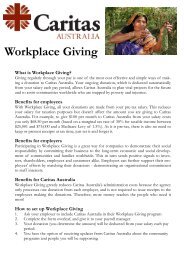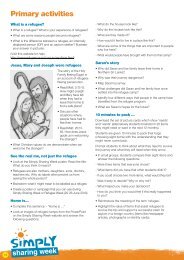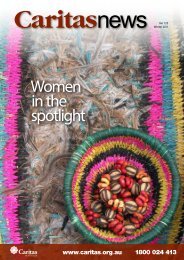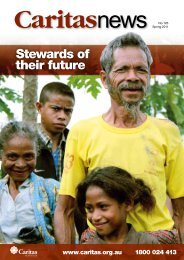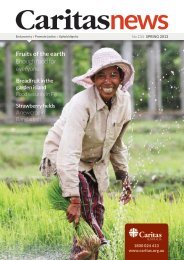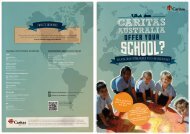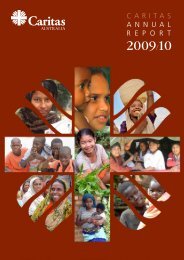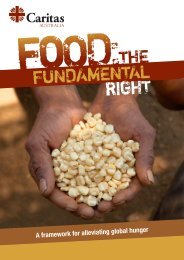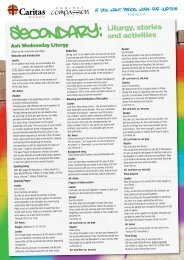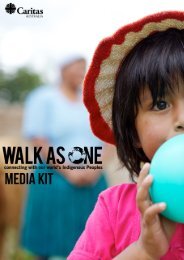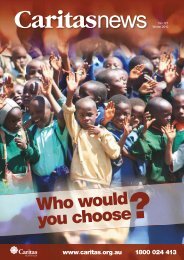Cambodia's champions of change - Caritas Australia
Cambodia's champions of change - Caritas Australia
Cambodia's champions of change - Caritas Australia
- No tags were found...
You also want an ePaper? Increase the reach of your titles
YUMPU automatically turns print PDFs into web optimized ePapers that Google loves.
Difficulties <strong>of</strong> accessYet even finding the poorest and mostvulnerable members <strong>of</strong> a communitycan be difficult: “The poorest are <strong>of</strong>tenthe most marginalised – they’re noteasily visible in the community. Whendonors come to town, the partnersattempt to highlight the most positiveaspects <strong>of</strong> the project and so we workhard to find out what the real issues are.The poorest lack the education and theconfidence to seek out help, and eventhe social structures <strong>of</strong> a communityand a culture can keep those that aremost vulnerable hidden from view; areal trust is needed in the relationshipbetween our teams and our partners sowe can bring these issues to light,” saysMr Daines.Justine McMahon has been leading<strong>Caritas</strong> <strong>Australia</strong>’s work across thePacific archipelagoes for over 10years and says a holistic approach todevelopment is key to reaching thepoorest communities. “If we can’twork with the poorest then we simplywon’t fulfi ll our own mandate.”Ms McMahon, her dedicated team,and the Pacific partners they workwith on the ground, look beyond themere symptoms <strong>of</strong> poverty, deliveringprograms to tackle the root causes <strong>of</strong>discrimination, poor healthcare andaccess to education.Whilst <strong>Caritas</strong> <strong>Australia</strong>’s workin Papua New Guinea is focused ondelivering essential services such asaccess to healthcare – including HIVtesting and medications to tackle theraging epidemic – our projects go wellbeyond mere service delivery. AsMs McMahon explains, one <strong>of</strong>the greatest challenges for PNG’sdevelopment is the issue <strong>of</strong> genderinequality that goes to the heart <strong>of</strong>how HIV is spread: “Despite the linkbetween the status <strong>of</strong> women, highrates <strong>of</strong> domestic and sexual violenceand the spread <strong>of</strong> HIV, <strong>Caritas</strong> is one<strong>of</strong> the very few organisations workingto bring men together to tackle theproblem at the source. If we are goingto stop the level <strong>of</strong> domestic violencewe need to be talking to the men inthe community and creating spaceto talk about these issues so men canunderstand the impacts <strong>of</strong> this violencethrough the experiences <strong>of</strong> their peers.It’s these creative approaches that arecrucial to achieving real <strong>change</strong>.”According to Mr Daines who hasbeen working in the internationaldevelopment arena for almost twodecades, this integrated approach todevelopment has a two-fold effect: itbuilds trust with the community andit builds the capacity <strong>of</strong> our partners.“By providing practical solutionsto tangible problems we begin thediscussion with the community anddemonstrate that we are there onlyto help. For instance, supplying awheelchair or even crutches to someonewho is disabled and cannot move aboutcan have significant benefits. We <strong>of</strong>tenfind that people with a lack <strong>of</strong> mobilityare good thinkers as their mobilityconstraints <strong>of</strong>ten mean they have had aartnership:CARITAS NEWS Spring 2010 | 5
lot <strong>of</strong> time to contemplate and observewhat is happening in their community.Providing them with the ability tomove around gives them renewedconfidence and immediately lifts theirvisibility, and <strong>of</strong>ten their status, withinthe community. Such simple acts canbe very empowering and strengthenslocal capacity in the longer term.Such actions or ‘gifts’ as providing awheelchair should be seen as ‘start-upgrants’ – getting people on their way‘from less human conditions to morehuman conditions’ (in the words <strong>of</strong>Paul VI).”While Scott Martin, <strong>Caritas</strong><strong>Australia</strong>’s Africa Regional Coordinatorthinks that using the term ‘poorest<strong>of</strong> the poor’ poses somechallenges, he is usinghis seven plus years <strong>of</strong>development experience inbringing the <strong>Caritas</strong> model<strong>of</strong> partnership to life. “Theterm poorest <strong>of</strong> the poor canbe quite disempowering forthe communities we workwith in Africa. A poll wetook amongst our partnerssuggested ‘most marginalised’is more appropriate.”He strongly advocatesthe focus on assisting veryvulnerable people and saysthat the way <strong>Caritas</strong> worksin building and supportingstructures that already operatein a community is crucialto sustainable developmentoutcomes.“A genuine partnership model,working through the structureswe already have in the Churchnetworks provides a strong basisfor genuine engagement and care forgrass roots people.”getting beyond charity“Allowing our partners to see that weare committed to building confidencewithin the community also hasbenefits for them,” Mr Daines suggests.“Through our active engagement withpartners, we demonstrate that ourpriorities extend beyond the financialobligations <strong>of</strong> the partnership. We areseeking to build trust and to highlightour commitment to creating genuinedevelopment opportunities for thepoorest and most vulnerable members<strong>of</strong> the community.For Ms McMahon trust is critical toeffective development: “Without trustwe cannot discuss difficult issues, wecan’t get an accurate picture <strong>of</strong> what’shappening, what the needs are andhow we should respond, and <strong>of</strong> course,without this information we are unableto accurately implement the requiredinterventions in a community.”Ranmal Samarawickarama, whodirects <strong>Caritas</strong> <strong>Australia</strong>’s work acrossthe South Asian region says the crucialelements in building a successfulpartnership are “trust, realisticobjectives, good communication andmutual understanding. When we getto the stage where partners can tellus they are not happyranmalSamarawickarama,<strong>Caritas</strong> <strong>Australia</strong>’sgroup Leader SouthAsia and East Timorin West papuawith something or feel they can behonest with us about the good thingsand the challenges, then we knowwe have a good relationship and willachieve better long term developmentoutcomes.”Mr Samarawickarama says we muststrive to work with the most vulnerablebecause if we do not we cannotachieve real <strong>change</strong> in the community.“Working with the poorest <strong>of</strong> the poorfocuses our work and energy on themost vulnerable and helps protect usfrom getting distracted. When we workfor the poorest there will be positiveimpacts on the rest <strong>of</strong> the community,but it doesn’t work the other way.”integral Human DevelopmentWhilst poverty is a global phenomenonthe manner in which it manifests aremanifold. Each community, eachculture and even each individual willexperience the impacts <strong>of</strong> poverty in adifferent way.This is why, as Ms McMahonexplains, the key to tackling povertyis a holistic approach that looks atimproving the human dignity <strong>of</strong>each person. “Needs are differentin each place. <strong>Caritas</strong> <strong>Australia</strong> is ageneralist agency that focuses not onone aspect <strong>of</strong> poverty such as food,clean water, health or education, buthas a reputation for beingflexible and responsive tothe unique needs <strong>of</strong> localcommunities.”<strong>Caritas</strong> <strong>Australia</strong>’s flexibleapproach is called an Integral HumanDevelopment model that places theindividual at the centre <strong>of</strong> a project andseeks to restore dignity for that personin their community.Mr Daines explains that thisis intricately tied to a focus onempowering communities to articulateand achieve their rights.“A rights based approach is very closelylinked to Catholic Social Teaching. Onceyou accept the principle that everyone isentitled to their human dignity, then youhave to protect and promote it. Inherent6 | CARITAS NEWS Spring 2010
in this understanding is that people havethe right to clean water, food, healthservices and access to an education.”Ms McMahon goes further sayingthe Catholic Social Teaching principlesgo beyond a rights based approach:“the rights based approach is a legalframework – our principles provide amoral framework and are hence muchmore powerful in achieving long term,community-owned outcomes.”Achievement, but not without riskWorking with extremely vulnerablecommunities is always challenging andseeking to unravel the interconnectedproblems <strong>of</strong> under-development withinthese communities can be exceedinglyd i f fi c u lt .“In Cambodia we arecurrently engaged in abeen sold by the government to therich. Although the houses at the sitewere built by the government – whoalso enforced the relocation – many<strong>of</strong> the poorest couldn’t afford to paythe fees to access the houses. Thesefamilies live in rudimentary sheltersconstructed from whatever plastic, tinand cardboard that they can salvage.“The living conditions are justhorrendous,” says Mr Daines,“amongst the worst that I have seen inany country in the last 18 years.”“The partners came to us and said,‘we planned to reach 125 young peoplethrough this program but we haveonly reached 25 so far’. They wereexceedingly embarrassed by whatAs Ms McMahon says, <strong>Caritas</strong> isplaying an important part in tacklingpoverty in assisting some <strong>of</strong> the mostvulnerable people, but everyone has a roleto play. “We’re playing a part [in addressingpoverty]. Yet no agency can solve povertyby itself; it has to be a concerted effort frommany different groups and individuals.”“Turning on the taps in a villagewhich has never had access to water isalways a huge feeling <strong>of</strong> achievement. Asis returning to a village or family andwitnessing improvements to their lives inmany ways,” says Scott Martin.Yet these are but contributions in thebigger efforts to tackle poverty that <strong>Caritas</strong>is engaged with here in <strong>Australia</strong> and<strong>Caritas</strong><strong>Australia</strong>’sScottMartin and<strong>Caritas</strong>Tanzania’speterMadukiworking inpartnershippartnership called ‘Youth For Peace’.Through this program young, educated,mostly middle class kids are going outinto very poor slum areas to identifygroups we can work with. These youngpeople are working to build a sense <strong>of</strong>community solidarity, but it’s no easyfeat,” says Mr Daines.The community in which the youngpeople are working is a relocationsite built by the government. Peoplehave been moved there followingremoval from inner city land whichhas suddenly become desirable andJustine McMahon works across the pacific, in communitieslike this one in papua new guinea, to implement creativeapproaches to tackling poverty at its sourcethey saw as a failure, yet as we talkedto them about the difficulties andthe outcomes they have achieved incommencing work with these 25 youngpeople, we realised that they hadgreatly underestimated the difficulties<strong>of</strong> this sort <strong>of</strong> work.”This is why the elements <strong>of</strong> a truepartnership are so important. “Weunderstand there are risks associatedwith working with very vulnerablecommunities, yet it is clear in ourmandate that we must take these risksas this is the only way we can standwith communities to begin to tacklestructures which keep people trappedin poverty.”around the world. The real challenge trulylies with us all. We call on you to stand insolidarity with <strong>Caritas</strong> <strong>Australia</strong> and youtoo can be a catalyst in the quest to finallymake poverty history.Build your own long-term partnershipwith <strong>Caritas</strong> <strong>Australia</strong> and communities bybecoming a hopegiver today:www.caritas.org.au/hopegiverNOTE: By the term ‘poorest <strong>of</strong> the poor’<strong>Caritas</strong> refers to the poorest in terms <strong>of</strong> food,shelter, clothing, access to education andhealth services; weakest in terms <strong>of</strong> capacity toinfl uence; the most vulnerable in any societyand those who are marginalised for reasons <strong>of</strong>race, disability, difference, gender etc.CARITAS NEWS Spring 2010 | 7
fghaniIsVIOLENCE being rewarded?SUGHARA WAS STANDING onthe steps <strong>of</strong> her small mud house,which was framed by green fields andtowering mountain peaks in GhorProvince in Afghanistan.She was busily spinning wool fromone <strong>of</strong> her wrists. She stopped for amoment to give us a huge smile and toshake our hands, before inviting us intoher home.Sughara began to spin again as sheshared her life story: “I’m marriedwith eight children. I guess that I’m30 years old, but I’m not sure.“My husband used to be a farmer,but he was injured and is nowparalysed so he’s unable to work. We’velived in Narmata village in GhorProvince for 15 years but the land yousee outside belongs to other people.“We have nothing because we usedto live in Uruzgan Province but had toleave during the Soviet invasion, and arenow landless…” Sughara paused for awhile, visibly affected by the memory <strong>of</strong>her old home.After a moment, she continued tospeak: “I spin wool and graze otherfamily’s animals for money but itdoesn’t bring in very much. Sometimesnot even enough to buy flour to feed mychildren. It takes me four days to spinone kilogram <strong>of</strong> wool, which earns meAfs 40 (approx $1). This winter we hadnothing – not even rice. My childrenwere close to dying. But two monthsago Catholic Relief Services (CRS) gaveme some food vouchers… which havelasted until now.”CRS is part <strong>of</strong> the <strong>Caritas</strong>Internationalis network and is one <strong>of</strong><strong>Caritas</strong> <strong>Australia</strong>’s local partners on theground in Afghanistan. With <strong>Caritas</strong><strong>Australia</strong>’s help, CRS has been ableto provide more than 200 vulnerablefamilies with vouchers which theyex<strong>change</strong>d for food and fuel in order tomake it through the ‘hunger season’.Handouts alone are not the answerto chronic food insecurity, and <strong>Caritas</strong><strong>Australia</strong> through our partner CRS isalso addressing the underlying causes<strong>of</strong> poverty, by helping people to receiveeducation and to earn a living.It’s here you can finally understandthe true meaning <strong>of</strong> war inAfghanistan – that it isn’t just aboutthe present conflict, but decades upondecades <strong>of</strong> fighting and heartache.Exact data is hard to come by, butaccording to government statistics,only 8% <strong>of</strong> people in Ghor have accessto safe drinking water, 86% <strong>of</strong> familiesare further than an hour away fromtheir nearest health facility or have noaccess at all, and more than half <strong>of</strong> the8 | CARITAS NEWS Spring 2010
population lives below the nationalpoverty line.Meeting basic needs is not easy atthe best <strong>of</strong> times. In orderto cope, many strugglingfamilies had to borrowmoney or go into debt withlocal storekeepers, leavetheir homes in search<strong>of</strong> jobs, resort to sellingprecious livestock, or worsestill, their daughters.Over half <strong>of</strong> all girls inAfghanistan are marriedbefore the age <strong>of</strong> 18, and ina culture where the groom’sfamily are expected to paya reverse dowry <strong>of</strong> up to$1,500, girls as young as 12may be sold into marriage to prevent afamily from starving.Our partner CRS found that37% <strong>of</strong> all households they surveyed“This winterwe had nothing– not even rice.My childrenwere closeto dying. Buttwo monthsago CRS gaveme some foodvouchers.”regularly spent entire days withouteating, 96% <strong>of</strong> families were regularlybuying food on credit and 53% <strong>of</strong>households no longer hadanything left to sell inorder to buy food.The needs and voices<strong>of</strong> millions <strong>of</strong> ordinaryAfghan men, womenand children are rarelyheard in the drama <strong>of</strong>war reporting. Time andtime again our staff aremoved by the incrediblehospitality that theyreceive, and impressed bythe courage and conviction<strong>of</strong> many <strong>of</strong> the Afghanstaff that continue to workso selflessly. Several had grown up asrefugees in Pakistan but had returnedto Afghanistan as adults because theywanted to contribute to its development.stan:Poor, peaceful provinces aresometimes being ignored. The majority<strong>of</strong> the international community’sfunding for international developmentwork in Afghanistan is being channeledinto areas <strong>of</strong> insecurity, such as Helmand,where international troops are based,giving the impression that violenceinstead <strong>of</strong> peace is being rewarded.Some Military Commanders havebeen given more money to spend on‘development’ projects than entire AfghanGovernment departments.The lasting impression <strong>of</strong> Afghanistanwas not that <strong>of</strong> destruction but potential;not <strong>of</strong> hostility but hospitality. Ofordinary people trying to survive in anextra-ordinary environment.As Dr Aziz from a local charity said:“It’s not just about one person, it’s about29 million humans. We all live here withhopes and fears.”<strong>Caritas</strong> <strong>Australia</strong> is also workingwith communities in Afghanistan on anEarly Childhood Development Programwhere children develop skills likecounting, while mothers attend classes.<strong>Caritas</strong><strong>Australia</strong>’sMelvilleFernandez,group LeaderHumanitarianresponse looksat a piece <strong>of</strong>art done bystudents in the<strong>Caritas</strong> <strong>Australia</strong>Early ChildhoodDevelopmentprogram inAfghanistanCARITAS NEWS Spring 2010 | 9
AnThuan’s mother uses therehabilitation trainingshe has receivedthrough the program tohelp her daughterinspiringstoryKate Teys, <strong>Caritas</strong> <strong>Australia</strong>’s Program Coordinator for China, Indonesia andVietnam, tells us about her visit to Quang Nam Province in Central Vietnamwhere she met participants in the Disability and Development program.THUAN THI TRINH is nine yearsold and lives with a disability. She hastwo older sisters. Her Mum farms fora living and her Dad is <strong>of</strong>ten awayearning an income.Since September 2008 Thuan andher mother have been participating in a<strong>Caritas</strong> <strong>Australia</strong> funded program whichworks with Parents Associations forchildren with disabilities. The programis implemented by <strong>Caritas</strong> <strong>Australia</strong>’slocal partner Catholic Relief Servicesand Thuan’s mother has received basictraining in how to do rehabilitationtechniques for her daughter’s physicalmobility challenges. Thuan has alsobeen visited by a tutor to receive homeeducation as part <strong>of</strong> the program.It was obvious to all that as soonas her teacher Tri Pham startedvisiting, Thuan showed how eagerand determined she was to make themost <strong>of</strong> the opportunity to begin hereducation. Thuan’s mother knew herdaughter could learn and tried to dosome home education herself but shedidn’t have enough confidence andwasn’t sure how to go about it.Tri Pham is a teacher from the nearbyschool who has been trained throughthe program in methods for teachingchildren with differing special needs –both in schools and in homes – for thosechildren who are not yet able to go toschool. At first Tri was coming twicea week but with the amazingly quickprogress Thuan made in utilising herhands from learning how to write, shebegan texting her teacher – from theirhome phone – asking him to visit more<strong>of</strong>ten. Soon they developed a specialbond and Tri was so impressed withThuan’s determination and progress inher study that he has been coming fourtimes a week. Both Tri and Thuan’smother have seen how much Thuanenjoys learning and how much happiershe has become since having theopportunity to study. At first her motherdid not have much hope and did notbelieve it was possible that her daughtercould progress so well. Now she realisesThuan can learn very well and accordingto her mother “it is a big success for herfamily”. She did not believe her daughterwould ever write but she can and evenbetter, it is very neat.The first thing Thuan’s teacherdecided to work on was how to get herto hold a pen. In his words, “I wenthome thinking about how I couldget Thuan to learn how to write.” Hethought, “I can get her to draw thingsfirst to practice that way.” She quicklybecame very good at drawing. Now shehas progressed to writing very beautifully.In six months she has learnt how to readand write and has finished Grade Oneand is now onto Grade Two. Her Mum’swish is for her to finish primary school.But at this rate Thuan will be finishingHigh School before her mother knows it.Thuan’s biggest wish is to get acomputer to play games and to designpictures.Aside from her amazing progressin her studies, Thuan’s mother whoreceived some basic training inrehabilitation has already helped improveThuan’s movements and ability to sit upherself and to move around more.In the picture, Thuan’s mother ispractising some <strong>of</strong> the rehabilitationtechniques taught to her as part <strong>of</strong> theprogram.One year later and 18 months intothe program, Thuan is finishing Grade 3.Thanks to the <strong>Caritas</strong> <strong>Australia</strong> programshe can now read and write very welland has also learnt how to type and usea computer. She has been practising onthe nearby school’s computer and hopesto get one <strong>of</strong> her own, as she would liketo use the creative s<strong>of</strong>tware to design artand create pictures.To help us transform the lives <strong>of</strong> otherslike Thuan, please donate today:www.caritas.org.au10 | CARITAS NEWS Spring 2010
Samon and Aunty Tou:Cambodia’s <strong>champions</strong> <strong>of</strong> <strong>change</strong>“I would like to tell <strong>Australia</strong>n people that ourfamily situation has improved a lot. I would liketo thank <strong>Australia</strong>n people for their supportand hope that the <strong>Australia</strong>n people willcontinue to support us to be self-dependent.”Samonlooks afterhis youngercousin,SopovEARLIER THIS YEAR <strong>Caritas</strong><strong>Australia</strong> introduced you to Samonand his Aunty Tou through ourProject Compassion feature story fromCambodia. As you watched or readSamon’s Lenten story in schools andparishes around the country, you hadthe rare opportunity to envisage life asa young Cambodian orphan strivingto work, learn and play in the remote,impoverished village <strong>of</strong> Kralanh.More than a year since we metSamon and prepared the snapshot <strong>of</strong><strong>Caritas</strong>’ Community EmpowermentProgram in rural Cambodia, <strong>Caritas</strong><strong>Australia</strong>’s Program Coordinatorfor Cambodia and the Philippines,Chanthea Nou, visited Samon andAunty Tou in their village to see howlife had <strong>change</strong>d since 2009.“Samon has gained weight and lookshealthier than my last visit,” Mr Nousays. “He was thrilled to see himself inthe Project Compassion DVDs, postersand teaching materials and was veryhappy that <strong>Australia</strong>ns had a chance tosee his life in Cambodia; to understandhow their support has helped him andhis family begin to support themselves.”Thanks to <strong>Caritas</strong>’ local partner,Salvation Centre Cambodia, Samoncontinues to attend the Happy HappyClub at school. Through music, sportand games, Samon and children likehim – vulnerable to the risk <strong>of</strong> HIV/AIDS infection – learn to preventthe spread <strong>of</strong> the disease, begin tochallenge the stigma surrounding HIV/AIDS, and gain an understanding <strong>of</strong>their human rights.Samon has many new skills fromthe Happy Happy Club but it is thesport that has really helped to buildhis confidence. “I feel fresh andhappy when I attend the club. I havelearnt songs,mathematics,and volleyball;sport makes mefeel happy and Ihave more friendsthrough playingsport,” he tellsMr Nou.As hisc on fi d e nc eincreases andliteracy skills improve Samon imaginesa bright future for himself as heprepares to sit the national exam toenter secondary school. But Mr Nouexplains, both Samon and his AuntyTou worry that Samon may one dayhave to chose between pursuing hiseducation – and dream <strong>of</strong> becomingan engineer – and supporting his auntyand younger cousin Sopov.“I have enough time for studying andplay now, but I have to help my auntywith the housework and look afterSopov so I’m afraid this will affect mystudy this year – I have to undertakethe national exam,” Samon explains.“If I pass the exam then I am worriedabout transport. It will be a longdistance from home to the new school;we only have one bicycle and most <strong>of</strong>the time it is being used by my auntyto earn income to support the entirefamily.”Aunty Tou, who suffered a severeillness earlier this year, also finds ithard to strike the balance betweensecuring Samon’s future and securingthe family’s livelihood: “even thoughI am sick, I have to work; I’m worriedthat I would not have enough moneyfor Samon to go to school,” she says.She also worries that if Samon wereto become ill or couldn’t contribute toAunty Tou inher thrivingbusinessthe housework and fishing it would be aheavy burden on the family.Despite the year’s setbacks andconcerns for their futures, both Samonand Aunty Tou believe the CommunityEmpowerment Program is teaching themthe skills and knowledge they need tobreak the cycle <strong>of</strong> entrenched poverty.In the past year Aunty Tou has joined amonthly group meeting to learn moreabout nutrition, education, and businessand farming skills.Though she continues to struggle witha digestive illness that saw her hospitalisedin early 2010, Aunty Tou has almostdoubled the pr<strong>of</strong>its <strong>of</strong> her small businessin just one year and is now looking foropportunities to grow the business: “I’mstill selling banh chhev (rice pancakes)and porridge and I have a plan to expandmy business for one more dish – I’m in theprocess <strong>of</strong> seeking permission to relocatemy store and improve it.”One year on, Samon and Aunty Touhave not liberated themselves from theconfines <strong>of</strong> poverty, nor are we likely tosee a fairy-tale ending in the short term.But with your ongoing support <strong>Caritas</strong><strong>Australia</strong> will continue to address thestructural causes <strong>of</strong> poverty, HIV/AIDS and food insecurity in Cambodia,standing by families like Samon’s eachstep <strong>of</strong> the way.CARITAS NEWS Spring 2010 | 11
Watertruly is lifeSTUDENTS FROM SCHOOLSin the Chengwe community inZimbabwe carried water in two litrecontainers from their homes to schoolso that they had water during theday. Sometimes their lessons wereinterrupted by trips to wells to collectwater for their school needs. Someschools were facing possible closurebecause heavy rain had washed awaytheir toilets and cholera outbreakswere common in the community. Forthese students, education providedhope for a brighter future but a lack <strong>of</strong>basic sanitation and water supplies wasdiminishing that hope.In response to cholera outbreaks inZimbabwe that have occurred since2008, the Environmental Sanitationand Safe Water program, a partnershipbetween <strong>Caritas</strong> <strong>Australia</strong> andAusAID, was implemented by CatholicRelief Services (CRS) in the threecommunities <strong>of</strong> Sanyati, Makonde andZvimba, providing safe, reliable andsustainable water sources. The programalso assisted communities by providingeducation to practice good hygieneand improve hygiene awareness tominimise health risks in the future.When Sandya Manickam, ProgramOfficer Humanitarian Reponse,<strong>Caritas</strong> <strong>Australia</strong>, visited the projectin January this year she found resilientand hopeful communities, despite thechallenges they faced.“The teachers and children wereso hospitable and shared with us themany needs <strong>of</strong> their students andfamilies and how they coped. In aparticularly poor community, teachersat one school shared with us a meal <strong>of</strong>chicken and rice.“They spoke with such warmth,dignity and gratitude for this relativelysmall intervention and highlightedthe transformation it has made in thecommunity.“In one school where we saw thenew toilet blocks being constructed,we also saw the old block. We almostcouldn’t get past the threshold becausethe stench was so bad. The old studentbathroom consisted <strong>of</strong> a long troughdivided into cubicles that were flushedout only once a day.“That was the reality <strong>of</strong> school lifebefore this program started.”In Zimbabwe, the cholera epidemicaffected about 100,000 people andkilled 5000 people. A combination<strong>of</strong> water shortages due to insufficientnumbers <strong>of</strong> drinking water boreholesand the collapse <strong>of</strong> many old and rundowntoilets because <strong>of</strong> heavy rain, notonly meant that the epidemic spreadrapidly, but that communities hadlimited means to address the causes.Boreholes provide the only source<strong>of</strong> safe drinking water, but 80% <strong>of</strong>boreholes were not functioning, leavingcommunities no other option thanto collect water from contaminatedsources that were <strong>of</strong>ten a long distanceaway, risking the health <strong>of</strong> theirfamilies and taking time away fromother important tasks like farmingand education. Ontop <strong>of</strong> this, people justdidn’t have sufficientaccess to informationabout hygiene practicesat a household andcommunity level.The AusAID fundedand <strong>Caritas</strong> <strong>Australia</strong>managed programdelivered by CRSin partnership withlocal dioceses andcommunities, started inJune 2009 and ran for ayear. It provided peoplewith access to publictoilets and safe, reliableand sustainable water sources throughthe delivery <strong>of</strong> 600 pit latrines, therehabilitation <strong>of</strong> 24 boreholes, thecreation <strong>of</strong> 12 new boreholes and therenovation <strong>of</strong> 10 public toilets.Participatory health and hygieneeducation sessions in communitieshelped to further reduce the incidences<strong>of</strong> cholera and outbreaks <strong>of</strong> diarrhoeaby improving knowledge about healthand sanitation. Over 100 village healthWater flowingfrom a newborehole pumpworkers were trainedto deliver workshopswhich reached7200 communitymembers, includingstudents in 31schools.Ms Manickam says that an importantpart <strong>of</strong> the program was empoweringcommunities to be part <strong>of</strong> the design,building and management process.“From visiting the program I can seethat this is an innovative communitybased program, for example peoplefrom the school and wider communityparticipated in the construction <strong>of</strong>toilet blocks and each family provided30 home-made bricks or $1 towardsconstruction,” Ms Manickam said.12 | CARITAS NEWS Spring 2010
Local builderswork on one<strong>of</strong> the newtoilet blocksat a schoolStudents are excited tosay thank you to <strong>Caritas</strong><strong>Australia</strong> and its partnersfor improvementsto water supply andsanitation in theirschools and communitiesWomen’s role in watercollection starts at an earlyage – the girls are pushingdown on the pump and filling20 litre containers whichthey fill, put on their headsand carry back to schoolWater point managementcommittees have been set up to ensurea continuing supply and equitableaccess to the water. Pump minderswere recruited and trained in pumpmaintenance so that if the pumpbreaks down, they can fix it themselves.The program worked with the Ministry<strong>of</strong> Health to train EnvironmentalHealth workers.There has been a significantreduction <strong>of</strong> cholera cases reported inthe three districts <strong>of</strong> Sanyati, Makondeand Zvimba. Since the start <strong>of</strong> theprogram, there have been no choleracases reported in the Zvimba district,which is a big improvement on 1269cases recorded between August 2008and May 2009.This program in Zimbabwe achievedits intended objectives and <strong>Caritas</strong><strong>Australia</strong> has been successful in gettingfurther funding <strong>of</strong> $1.8 million fromAusAID for an 18 month EnhancedRural Water and Sanitation RecoveryProject which continues and expands onthe previous program’s activities. Startedin July 2010, the program builds on theimprovements made in water supply,health and sanitation in the communities<strong>of</strong> Makonde and Sanyati to an additional6500 households and expansion into thepriority <strong>of</strong> food security sector for 2000most affected households in Hwange.<strong>Caritas</strong> <strong>Australia</strong> has built a <strong>Caritas</strong>Consortium with Catholic ReliefServices Zimbabwe, Catholic AgencyFor Overseas Development Zimbabwe,<strong>Caritas</strong> Chinhoyi, <strong>Caritas</strong> Harare and<strong>Caritas</strong> Hwange to deliver this programin the spirit <strong>of</strong> partnership.Children at one <strong>of</strong> the schools visitedby Ms Manickam and her colleagueshad prepared a traditional performancefor them. As the children sang in locallanguage, danced and beat drums, MsManickam turned to one <strong>of</strong> the teachersand asked: “What are they singing about?”The teacher replied, “Listen carefully,they are singing ‘thank you <strong>Australia</strong>’.”To continue to provide life-changingassistance in countries like Zimbabwewe need your support. Turn to page 16 topurchase a Global Gift <strong>of</strong> water today togive to someone special this Christmas:www.caritas.org.au/globalgiftsCARITAS NEWS spring 2010 | 13
Educationfor DarfurJOHN BIRCHENOUGH, THE COUNTRY FUNDING MANAGER FOR NORWEGIANCHURCH AID, ONE OF CARITAS AUSTRALIA’S LOCAL IMPLEMENTINGPARTNERS IN SUDAN, REPORTS FROM A SETTLEMENT IN DARFURTHE FOUR MEN who sit oppositeme are members <strong>of</strong> the Arab Rizegattribe, and are nomads. I have beenintroduced to them by El FadilAbdullah Tambour, the coordinatorfor the Norwegian Church Aid (NCA)Darfur Emergency Program ResponseUnit in Sudan. <strong>Caritas</strong> <strong>Australia</strong>provides ongoing funding to the ACT/<strong>Caritas</strong> Darfur Program, with NCA alocal implementing partner.A long time ago the men’s sub-tribethe Mahariya came from Kutum inNorth Darfur. About 30 years agothere was a drought and the tribe wentin search <strong>of</strong> fresh grazing and water.They came to South Darfur but many<strong>of</strong> their animals perished from droughtand disease. Since 1974 they havestayed in one place. In the old daysthey had camels, but since they lostthem they only have goats and sheepand a few cows.Their settlement is called a Damrain Arabic. The Damra consists <strong>of</strong> about1400 households, although the numberfluctuates. Other members <strong>of</strong> thesub-tribe are today scattered arounddifferent parts <strong>of</strong> South Darfur.I ask them how life has <strong>change</strong>d overthe years. The response is interesting.I expected them to talk about thedifference in lifestyle, but instead theytalk about education. “Our fathers didnot push us to educate ourselves,” theytell me, “the children used to spend theirplaying time in the wadis (riverbeds).“Over the past five years, sincethe arrival <strong>of</strong> the international nongovernment organisations (INGOs),we have realised how important it is tohave an education for our children, sotoday we are encouraging our childrento go to school.“Life is also more difficult today;before you could easily pick up yourstick, take your goat or a sheep andizdiharreceives herschool kitwalk to market in El Fashir, for example.Today there is more insecurity andmovement is more difficult.”Today men from the communitywork as cattle drovers or work in thecattle market in places like Nyala asmediators between the buyers andsellers. Others look for work furtheraway, even as far as Egypt and Libya;women go out to collect firewood to sell.It is not always easy to findassistance for those very vulnerable andthe government is not always able t<strong>of</strong>ulfi ll needs quickly. When the leaders<strong>of</strong> Mahariya heard that INGOs hadcome to Darfur to help people in needthey sought out a list <strong>of</strong> organisationswho might be able to help them; onthat list was NCA.NCA provided assistance forvulnerable households including Jerrycans and shelter material as well asplastic mats for children to sit on intheir classrooms.A local NGO partner has builtthe community two classrooms;the community contributed twoclassrooms itself. The classrooms arebuilt <strong>of</strong> local materials that need tobe replaced every eight months or so,but at least it is an opportunity for thechildren to study.When I ask the men about thefuture their emphasis is again oneducation.They tell me about the traditionalway <strong>of</strong> learning; they want to developprinciples <strong>of</strong> learning for all – old andyoung – promoting culture, spiritualvalues and addressing global <strong>change</strong>s.“People can lose riches, but theycan’t lose knowledge, if they have aneducation there is always a future forthem, that is why we want to investin a better future for our childrenthrough improving their educationenvironment.“We expect a peaceful life againone day, but we need to be honest indealing with problems, honest withinour own and with other communitiesand honest with each other.”14 | CARITAS NEWS Spring 2010
Introducing<strong>Caritas</strong> <strong>Australia</strong>’sGlobal Gifts 2010GLOBAL GIFTS ARE anopportunity to mark the comingfestive season with caritas: loveand compassion. Giving one <strong>of</strong> ourGlobal Gifts cards this Christmas,you are giving a Gift <strong>of</strong> Life.<strong>Caritas</strong> <strong>Australia</strong>’s Global Giftsembrace the true spirit <strong>of</strong> Christmasgiving, allowing you to make a realdifference in the lives <strong>of</strong> the world’smost marginalised people.At <strong>Caritas</strong> <strong>Australia</strong> we focuson building stronger communities;we believe that by challenging thestructural causes <strong>of</strong> extreme poverty,we can help build confidence andcapacity in communities plaguedby uncertainty. Each GlobalGift represents one <strong>of</strong> our coredevelopment priorities.Our Christmas cards – uniquelydesigned for <strong>Caritas</strong> <strong>Australia</strong> –together with our Gift <strong>of</strong> Lifeinside, make a beautiful alternativeChristmas gift for loved ones. Youcan choose from six Gifts <strong>of</strong> Life:Peace, Food Security, Health, Water,Education and Disaster Response andeach one doubles as a Christmas treeornament for your loved one to enjoyover the festive season.HOW GLOBAL GIFTS WORKS…12Choose aGift <strong>of</strong> LifeComplete the order3form on page 16You receive yourchosen Gift <strong>of</strong>Life insertedinto a beautifulChristmas card4Give your Gift <strong>of</strong> Lifeto your loved one as analternative Christmaspresent5By buying a<strong>Caritas</strong> GlobalGift you havehelped to<strong>change</strong> livesTHIS YEAR CARITAS <strong>Australia</strong>’sBe More Weekend went global withover 5,500 participants across <strong>Australia</strong>and community actions in Tanzania,Indonesia, Pakistan and Papua NewGuinea.Held each August, the Be MoreWeekend is a grassroots, communityevent that anyone can join. This year’sweekend focused on the global issue<strong>of</strong> water security, challenging us tore-think how we use this preciousresource.Across <strong>Australia</strong> Be More supportersembraced the water conservationmessage and came together insolidarity over three days <strong>of</strong> grassrootsaction. Sculptures <strong>of</strong> plastic waterbottles adorned public spaces; schoolsand parishes and families conductedwater audit projects, water liturgies,and cleaned up local waterways.In Perth residents gathered at LakeMonger to walk in solidarity withthose who endure water insecurity inmarginal communities worldwide atthe Be More Water Family Fun Dayfor a day <strong>of</strong> activities and advocacy.Locals had a chance to understand thevulnerability <strong>of</strong> millions living withoutaccess to clean water, and to learnmore about local water conservationinitiatives.Children learn aboutthe global issue <strong>of</strong>water at beautifulLake Monger,Western <strong>Australia</strong>pastor Anwar raisesawareness <strong>of</strong> waterconsumption withfamilies in SialkotCantt, pakistanBe More Weekend <strong>of</strong>global water action“Participating in a <strong>Caritas</strong> Walkfor Water is an act in solidarity withthose women and children whoseopportunities to attend school, to behealthy and to be nourished are severelylimited by the scarcity <strong>of</strong> safe water intheir communities,” said Janeen Murphy,<strong>Caritas</strong>’ Global Education Advisor forWestern <strong>Australia</strong>.Further afield Shamoun MasihKhokhar, Chairman <strong>of</strong> the MadawaDevelopment Society in Pakistan’sRasul Pur Bhallian district, took themessage <strong>of</strong> water conservation andsanitation into the streets and homes<strong>of</strong> his village. “We contacted the keypersons like our pastors and Imamswho are <strong>champions</strong> in our region <strong>of</strong>Sialkot,” explains Mr Khokhar. Usingthe opportunity to speak at Sundayand Friday masses, the group raisedwater conservation issues and promotedgood health and sanitation practices inthe community.<strong>Caritas</strong> <strong>Australia</strong>’s Be MoreCampaign is inspired by the words <strong>of</strong>Archbishop Oscar Romero: “Aspire notto have more but to be more.”To find out how you can Be More everyday and get involved in next year’sBe More Weekend visit our websitewww.bemore.org.auCARITAS NEWS Spring 2010 | 15
____________________________________________________________________________________________________________________________________________________________________________________________________________________STEP 1: Choose your gift(s)GIFT PRICE QUANTITY TOTALPeace $20.00Food security $40.00Health $50.00Water $75.00How Global Gifts worksSix Gifts <strong>of</strong> Life are available. From foodsecurity to water, disaster response tohealth, each Gift <strong>of</strong> Life will make a realdifference to the lives <strong>of</strong> individuals, familiesand entire communities around the globe.All you need to do is choose a Gift <strong>of</strong> Lifeand complete the order form. You will thenreceive your chosen Gift <strong>of</strong> Life in a beautifulChristmas card to give to your loved one asan alternative Christmas present.Education $100.00Disaster response $200.00STEP 2: Your contact detailsDonor Number (if known)NameMs Miss Mrs Mr or other:AddressSuburb State Postcode$PhoneDate <strong>of</strong> birthEmailSTEP 3: Choose your payment methodI enclose a cheque/money order (made payable to <strong>Caritas</strong> <strong>Australia</strong>), ORWATE RC A R I T A S G L O B A LGI F T S“If there is magic on this planet,it is contained in water”LOREN EISELEYPlease charge my credit card (please tick one box)Mastercard VISA Amex Diner’s ClubTHE GIFT OF LIFE HAS BEENPURCHASED ON BEHALF OFB YCard Number: ___ ___ ___ ___ ___ ___ ___ ___ ___ ___ ___ ___ ___ ___ ___ ___<strong>Caritas</strong> <strong>Australia</strong>GPO Box 9830 Sydney NSW 2001Donations <strong>of</strong> $2 and over are taxdeductible. Visit us online atwww.caritas.org.auExpiry Date: ___ ___ /___ ___ Name on card: ___________________________________Signature: ___________________________________________________________________Your order will be dispatched after 15 October 2010 and last orderswill be taken on 15 December 2010 to arrive in time for ChristmasGLOBAL



